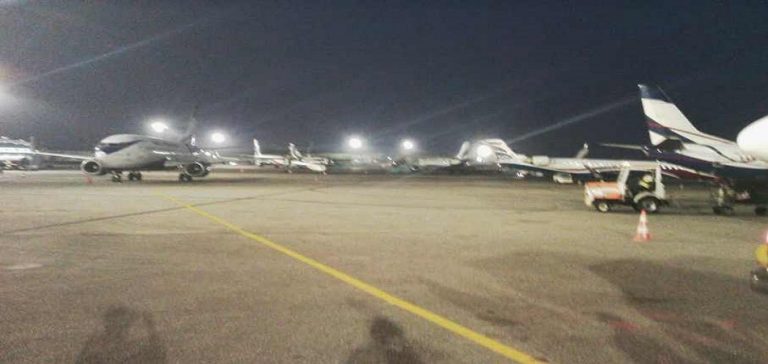
Nigeria’s aviation sector has received a significant boost as the Aviation Working Group (AWG) increased the country’s Cape Town Convention (CTC) compliance index score from 49 percent to 70.5 percent.
This development, announced by AWG Secretary-General Jeffrey Wool, signifies that Nigeria is now considered a safer environment for aircraft leasing, positioning the country as a more attractive destination for international aviation financing and leasing.
The AWG, a non-profit organization that includes major aviation manufacturers, leasing companies, and financial institutions, plays a critical role in shaping global aviation finance policies and regulations. By raising Nigeria’s compliance score, the group has affirmed the country’s commitment to adhering to the legal framework of the Cape Town Convention.
Register for Tekedia Mini-MBA edition 19 (Feb 9 – May 2, 2026): big discounts for early bird.
Tekedia AI in Business Masterclass opens registrations.
Join Tekedia Capital Syndicate and co-invest in great global startups.
Register for Tekedia AI Lab: From Technical Design to Deployment (next edition begins Jan 24 2026).
A Shift in Nigeria’s Aviation Standing
Nigeria’s journey towards compliance saw a critical turning point with the signing of the CTC practice direction on September 12 by John Tsoho, the chief judge of the Federal High Court. This move, part of the government’s broader efforts to reform the aviation sector, was initiated during a meeting of the Presidential Enabling Business Environment Council (PEBEC) chaired by Vice President Kashim Shettima.
The signing came after Nigeria was previously viewed as a non-compliant country under the Cape Town Convention, leading to its blacklisting by the AWG. Speaking about this during a press briefing, Festus Keyamo, Minister of Aviation and Aerospace Development, acknowledged that Nigeria’s prior non-compliance had deterred international stakeholders, but the new direction marked a reversal of that perception.
The Legal Impact and AWG’s Revised Score
In his letter to the minister, Wool highlighted that Nigeria’s increased score was a direct result of significant legal developments in the country’s aviation framework. He praised the efforts made to bring Nigeria into compliance, particularly emphasizing the legal significance of the CTC practice direction, which ensures that Nigerian courts apply the Convention without interference from other local laws in relevant cases.
According to the AWG, the new legal directions supersede previous non-compliant judicial precedents in Nigeria. The group’s evaluation raised the variable B score—which measures the legal application of the Convention—from 1 to 3. This adjustment reflects the improved compliance standards and adherence to CTC protocols.
AWG further noted that the practice direction signals a commitment to continue increasing compliance. Nigeria’s variable C score was also upgraded, from 3 to 5, indicating the country’s progress in meeting its obligations. Moreover, the variable D score, which evaluates the effectiveness of communication between the Nigerian authorities and AWG, was similarly increased from 3 to 5.
Thanks to the Nigerian Government’s Corrective Action
The AWG’s decision to increase Nigeria’s score stems from the corrective actions the government took to address previous issues of non-compliance. The practice direction directs courts to prioritize CTC obligations in aviation leasing cases, removing legal ambiguities that had hindered Nigeria’s compliance.
The positive development means that Nigeria is no longer at risk of losing its OECD discount eligibility—a status that provides the country with more favorable terms in international financial agreements. The AWG explicitly stated that it would no longer recommend a review of Nigeria’s eligibility for the discount based on past non-compliance.
However, despite these advancements, the AWG cautioned that Nigeria remains on the CTC compliance watchlist. The country is still undergoing a separate compliance-related review, meaning further developments could impact its future rating.
A New Era for Aircraft Leasing in Nigeria
This dramatic improvement in Nigeria’s CTC compliance score is expected to have far-reaching effects on the aviation industry. With the updated score, Nigeria is now viewed as a more reliable market for international aircraft leasing companies, which could attract more investment into the sector. Additionally, increased leasing activity could reduce costs for domestic airlines, which often face challenges in acquiring and maintaining aircraft.
The reform comes at a critical time for Nigeria’s aviation sector, which has been grappling with various challenges, including high operational costs, currency depreciation, and infrastructural deficits. As international aviation leasing becomes more viable, the sector may see a revitalization, providing a much-needed lift to the country’s struggling airlines.
New Opportunities Ahead
While Nigeria’s rise in the CTC compliance index is undoubtedly a positive development, challenges remain. The country must now focus on maintaining its compliance with the Convention and ensuring that all judicial and regulatory bodies consistently apply the new legal standards. Failure to do so could result in another drop in compliance, which would negatively impact investor confidence.
Experts in the aviation sector have lauded the government’s efforts but have also stressed the importance of ongoing legal and regulatory reforms. Ensuring that the Convention is uniformly applied across all relevant cases will be crucial in sustaining the progress made. With further improvements, Nigeria could see its compliance score rise even higher, unlocking new opportunities for growth and development in its aviation sector.



